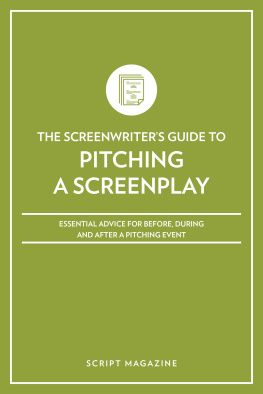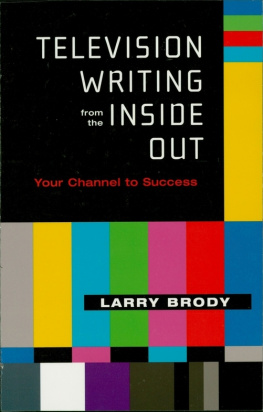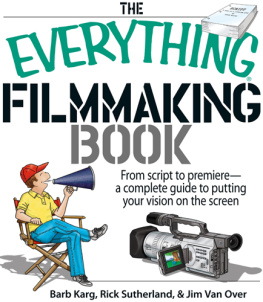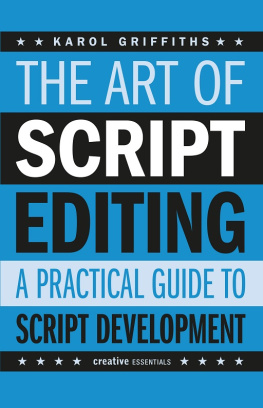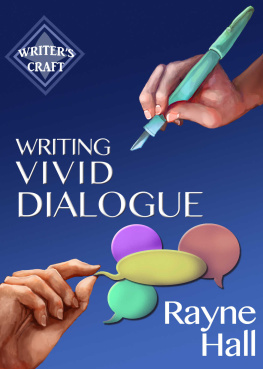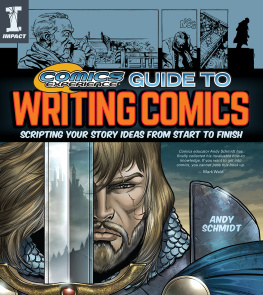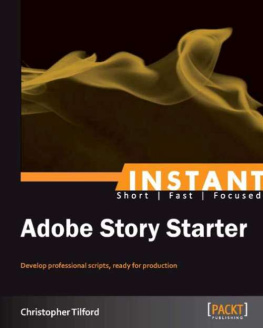Writing Television Drama
Nicholas Gibbs
This book is dedicated to my fellow writers Natalie Cheary, Paul Fleming and Carol Kearney.
It is also dedicated to my family, Gaynor, Stevanie and Skye.
And finally it is dedicated to all those writers who write or want to write television drama.
Writing Television Drama
Nicholas Gibbs
Acknowledgements and credits
First I would like to thank everyone in the television drama industry who advised me and provided me with information during the writing of this book including Paul Ashton (BBC Writersroom), Caryl Benee (ITV), Laura Brown (BBC), Natalie Cheary, Rachelle Constant (BBC), Victoria Fea (ITV), Amy Gill (Red Productions), Eleanor Goldwin (BBC), Simon Harper (BBC/Holby City), Lucy Hay (Bang2write), Estelle Hind (ITV), Lisa Holdsworth, Francis Hopkinson (ITV Studios), Charlotte Jones, Tony Jordan (Red Planet), Bryan Kirkwood, Nicola Larder, Beth Levison (BBC), Hayley McKenzie, Marc Pye, Lisa Regan (Lime Pictures), Jenny Robins, Leah Schmidt, Emma Smithwick (Lime Pictures), Ben Stephenson (BBC), Ben Stoll (Channel 4), Sally Wainwright and Kirsten Wardlaw (ITV), plus the many more who have chipped in and helped facilitate research and interviews.
The author and publisher would like to thank the following companies for permission to print the following extracts:
: From the pilot episode of Harrys Law Bonanza Productions Inc.
: From Hustle, Series 1, Episode 1 Kudos Film and Television
: From The Flasher, episode of The Street ITV Granada
: From The Socrates Method, episode of House Universal Television
: From Hustle, Series 1, Episode 1 Kudos Film and TV
and 11.3: From Left Field, episode of New Tricks Wall to Wall
Contents
Meet the author
Welcome to Writing Television Drama!
Fellow writers, I have felt your pain and your frustration. I have experienced script readers read the same script where one has praised and loved the beautifully executed characterization and another has said the characterization wasnt rounded enough! I have been long-listed, short-listed, not even listed (for the same piece of work). I have had scripts championed by producers. I have had projects miss out through timing, budgets and the very system itself! So has every credited writer whose work ends up on screen.
I am a writer and BBC-trained script editor who is asked to read and provide feedback for scripts. I get asked to run scriptwriting workshops and do the occasional lecture on the subject. I love stories and always have done from writing my very first tale about astronauts meeting dragons on the Moon at the age of six to my more recent forays into journalism, theatre and radio. My first love, though, is television drama and the people who want to and do make it.
I hope this book is useful to you, the writer.
Nicholas Gibbs
May 2012
Introduction
Everyone loves stories. Everyone loves stories told on television from the wonder of the childhood years through the rebellious teen stories to the big themes as the world opens up to adulthood. These are stories that tell us about lives beyond the walls of our home, our street, our town, our nation, our planet, our time or even our universe.
All stories, all dramas, tell us something about the human condition. About what man was, what man is, what man will be, what man could be. From gritty social dramas such as Jimmy McGoverns Accused, to the splendour of Julian Fellowes Downtown Abbey, the comic fantasy of Toby Whithouses Being Human, and the intensity of Neil Crosss Luther.
We root for the cops and private detectives that seek to solve crime in their own inimitable way from the marvellously reimagined Sherlock to the old school of New Tricks. We delve into lives of the medical profession in shows such as Monroe and Casualty.
Casualty, of course, is what the industry terms a continuing drama series. The ultimate continuing drama series is one that has seen more than half a century of stories told about the residents of a little fictitious road in the northern English city of Manchester called Coronation Street.
From the United States, we see the cream of American television that elevates the drama bar even higher, with shows such as House, about a maverick genius doctor who solves difficult medical cases; Dexter, where our hero is a serial killer; Ugly Betty, about the girl who dreams of being a writer; and Battlestar Galactica, a space opera about mankind in the universe.
These are the shows that have set the bar and with which you, the new upcoming scriptwriter, has to compete compete with your unique voice, your unique story and your distinctive characters and through a standout good-quality script that has to impress people within the industry.
Aside from the established writers some of whom are mentioned above you are also competing against all the other newbie writers. The BBC Writersroom alone receives more than 10,000 speculative scripts a year. The Writers Guild of America registers around 50,000 television and film scripts per year.
This book is designed to help you write the best possible script that you can before you send it off to people within the industry. Within these pages there will be insights from writers as well as interviews with the people you will have to impress with your script from script readers to commissioners and all points in between. We will reference helpful resources to which you can turn for extra information and advice.
We will also examine the various avenues that are available to get you noticed as a writer whether you are a novice or someone who has found their ambition stalled. In the second half of the book we will take a snapshot of the industry as it is today and the opportunities available.
There are two elements, however, about which I cannot make any promises, and these are luck and timing. No matter how good your script is, you need both these things. Even established writers need these two elements to coincide for their next project to happen. However, if these two gods do their bit for you, lets make sure that you have your work in the best place it can be.
You do need a completed script and in all probability a second completed script and loads of ideas. An unfinished script is of no help or interest to anyone.
Scriptwriting is not an easy task. What you are aiming to do is to create and present a piece of work of high quality and potential. It will require perseverance and resilience because the road is a tough one. As a minimum, you have got to like your own company and, more importantly, enjoy the actual process of writing. The more you do, the better you will get at it.


